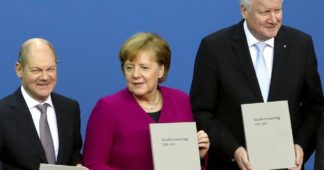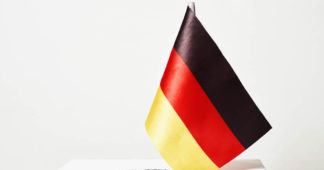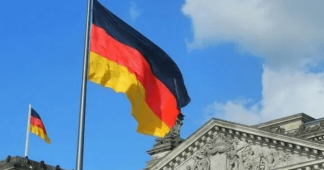By Ines Schwerdtner
Dec.8,2021
Today, the Social Democrat Olaf Scholz became leader of Germany’s new government. But with fiscal hawk Christian Lindner in charge of the finance ministry, there’s little hope of Germany — or Europe — breaking free of neoliberal dogmas.
“Dare more progress,” proclaims the title of the coalition agreement sealed by Germany’s Social Democratic Party (SPD), Greens, and liberals. The new administration — formally taking office today — is trying to encapsulate a particular Zeitgeist for modernization, after sixteen years of social and climate-policy gridlock under Angela Merkel’s rule.
The title is also something of a nod to the past: West Germany’s first Social Democratic chancellor Willy Brandt gave his 1960s social-liberal administration the motto “dare more democracy.” But if he knew this slogan was now being perverted in this way, he would probably be turning in his grave. For the newly formed “Alliance for Freedom, Justice, and Sustainability” decisively bears the hallmarks of liberal influence — or rather, the power of market radicals.
Paradoxically, this free-marketeer takeover goes unnoticed because its narrative of “progress” fits perfectly into the program of incoming chancellor Olaf Scholz, himself an SPD grandee. In his previous post as finance minister in a grand coalition, Scholz was most loyal to Chancellor Merkel — probably even more so than her conservative ministers. She entrusted Scholz with the financial brief because she knew he was on the same page as her own party: austerity when needed, state spending only during crises.
Loose Debt Brake, Strict Finance Minister
There have been some concessions to the reality of the crises we’ve just experienced. The coalition agreement promises steps to reform the infamous “debt brake” that has held back necessary investments since the financial crisis. Among other things, a climate fund is to be established, the German railway (Deutsche Bahn) authorized further loans, and the coronavirus-induced suspension of the debt brake used a little longer. However, since Christian Lindner and not Green coleader Robert Habeck will now be finance minister, the actual implementation of such policies still hangs in the balance.
Unlike previous coalition agreements, in which investment projects were usually quantified, this one doesn’t mention any specific figures. It only tells us that what is being proposed is necessary. That may be true. Yet the problem is that Lindner and his party have consistently pursued an agenda focused on their own clientele, supporting millionaires and not the general public, let alone working people. In government from 2009 to 2013, the FDP became famous for a tax cut soon labeled the “Mövenpick tax” — a reference to a wealthy family that owns a hotel chain and an ice-cream brand and who later gave generous donations to the FDP. There is no reason to expect the party to act any differently now.
The Rich Win Again
In recent decades, almost all taxes have been drastically reduced for the rich — but have directly or indirectly increased for the vast majority. The slow rise in deductions devours middle-class salaries, while value-added tax (VAT) increases eat into low incomes. During the election campaign, all three “traffic-light” parties agreed: the burden on low earners and the middle class must be relieved. This is now proving to be empty campaign rhetoric.
During the coalition negotiations, we time and again heard that plans for a tax cut would fail because of the need to refinance such a step. This is the ultimate stage of nonsense of Germany’s debt brake, which implies revenue neutrality.
Even with the FDP in the coalition, it would have been possible to cut income tax for lower earners and the middle classes by raising another tax or even foregoing other types of spending. Apparently, however, this was pretty far down the list of priorities for the SPD and the Greens. In the end, the rich could end up winning again. Lindner will ultimately remain true to his election campaign dogma: with us, there will be no tax increases.
Attacks on Pensions and Southern Europe
The new administration’s fiscal policy offers some improvements on the Merkel era but also setbacks. To be welcomed is a mooted ban on purchases of real estate through share deals or cash payments, as is a debt fund for local governments to bundle and repay their debts to gain fiscal leeway. Here, the SPD seems to have had its way.
On the other hand, the government is to examine a further partial privatization of pensions. Lindner proudly describes this as an “entry point” — that is, a step toward wider financialization. Even if equity pension schemes would initially only be an individual choice, this would weaken existing pension financing and drive further pressure for “reforms” privatizing the whole system.
Fatally, both the Greens and the SPD folded on their commitment to alter the European Union (EU) Treaty on Stability, Coordination and Governance in the Economic and Monetary Union , although both their election programs at least envisaged its reform. The Fiscal Compact stipulates a maximum annual deficit of 3 percent of GDP and a maximum debt of 60 percent of GDP. As seen in the recent sovereign debt crises, this is the European Commission’s most important means of exerting pressure on southern EU countries to pursue a restrictive fiscal policy, as otherwise there is the threat of Brussels directly intervening in budget decisions.
A Special Kind of Progressive Neoliberalism
Lindner openly calls the new government a coalition of the “center,” as opposed to more euphemistic talk of a “center-left” pact. By this, he means a new market-liberal center that will manage the status quo. The common thread in the coalition agreement: the state does get to do stuff, but only so long as the rich can make money from it.
Not only is Scholz similar to Merkel in terms of his style of governance (widely characterized as more robotic than human), but despite the end of Christian Democratic dominance, the political center in Germany has only slightly shifted to the left, especially in terms of social reforms. After sixteen years of gridlock in basically all fields under conservative rule, the term “progress” has lost all its meaning. Only under those circumstances may a coalition like this dare to call itself “progressive.”
We can thus say that the traffic-light coalition is a very specific form of progressive neoliberalism — with some social democratic policies sprinkled over a substantial maintenance of the fundamentals of Merkel’s Germany.
The traffic-light coalition above all promises “progress” on some key social policies, for example on abortion, cannabis legalization, and the reform of citizenship law. But the mere fact it loosens the CDU’s blockade in some areas should not obscure that the agreement leaves the essential issues of inequality untouched. At most, it catches up somewhat on liberalization measures long (rightly) demanded by pressure groups.
Indeed, if abroad Germany is sometimes seen as a forerunner on social policies, it’s actually lagging behind: paragraph 218 of the criminal code, which criminalizes abortion, dates back to 1871, with conditional exceptions introduced in 1976. The new coalition agreement does not even abolish this paragraph completely but instead removes another paragraph that regulates information on abortion. This should make access easier — but won’t improve general conditions for doctors or patients.
Likewise, we cannot expect a “feminist” foreign policy from Greens coleader Annalena Baerbock, as some German newspapers have suggested. Her party has already signaled that a foreign ministry led by Baerbock would want to use combat drones, and a green party emphasizing its establishment credentials has assumed a staunchly pro-NATO stance directed against Russia and China. Thus, a superficial veneer of “progressiveness” is used to conceal a further extension of German overseas military deployments and far-reaching interventions in the welfare state.
Tragedy of the Opposition
The conservatives will now rub their hands: Not only are they rid of the tiresome coronavirus policy — and also the entire fiasco in the health sector, bequeathed by the grand coalition and its health minister, along with its corruption scandals around the mask supply. They can now let the traffic-light coalition slip right into the fourth wave of the pandemic while the Christian Democratic Union (CDU) can now consolidate more or less in peace. Right-winger Friedrich Merz’s chances of becoming party chairman have never been better, assuming he doesn’t play power politics quite as stupidly as in previous attempts.
The already market-radical center of the traffic-light coalition is thus surrounded by the liberal-conservative opposition coming from the Christian Democrats, which may even be ideologically supported by the anti-immigration Alternative für Deutschland (AfD, Alternative for Germany) in parliament. These are the two strongest opposition parties — and form a frightening potential right-wing bloc. Just over the border in Austria, we have in recent years seen the “modernized” conservative People’s Party form federal governments together with the far-right Freedom Party.
This may not immediately be in the cards in Germany. Yet the center of the conservative party that was held together by Merkel for years will crumble as soon as she withdraws and a new leader is elected in January. The tension already apparent in the party (especially in the East, where CDU and AfD have already worked together on some issues) may well burst into the open.
The German left faces particularly difficult times ahead. Residual left-wing elements of the Greens and the Social Democrats have had little bearing on the coalition agreement, and outside of government the socialist Die Linke is mainly struggling with itself. Its shrunken parliamentary cohort today boasts only thirty-nine MPs (a fall of thirty) and its meager 4.9 vote share in September risked it dropping out of the Bundestag altogether, save for a special concession for parties who win sufficient one-member constituencies. This sharp setback, combined with a certain lack of direction, make it almost impossible for Die Linke to gain the initiative, especially with the Right dominating the opposition benches.
The new center of the traffic-light coalition has an especially easy time of things, parrying Die Linke’s attacks by insisting that this is a coalition for “progress” as opposed to backward-looking nostalgia. To resist this characterization, the Left will have to redefine what social progress means in a substantial way — but also fight to win back a base in German society to support this agenda
Published at www.jacobinmag.com
We remind our readers that publication of articles on our site does not mean that we agree with what is written. Our policy is to publish anything which we consider of interest, so as to assist our readers in forming their opinions. Sometimes we even publish articles with which we totally disagree, since we believe it is important for our readers to be informed on as wide a spectrum of views as possible.











